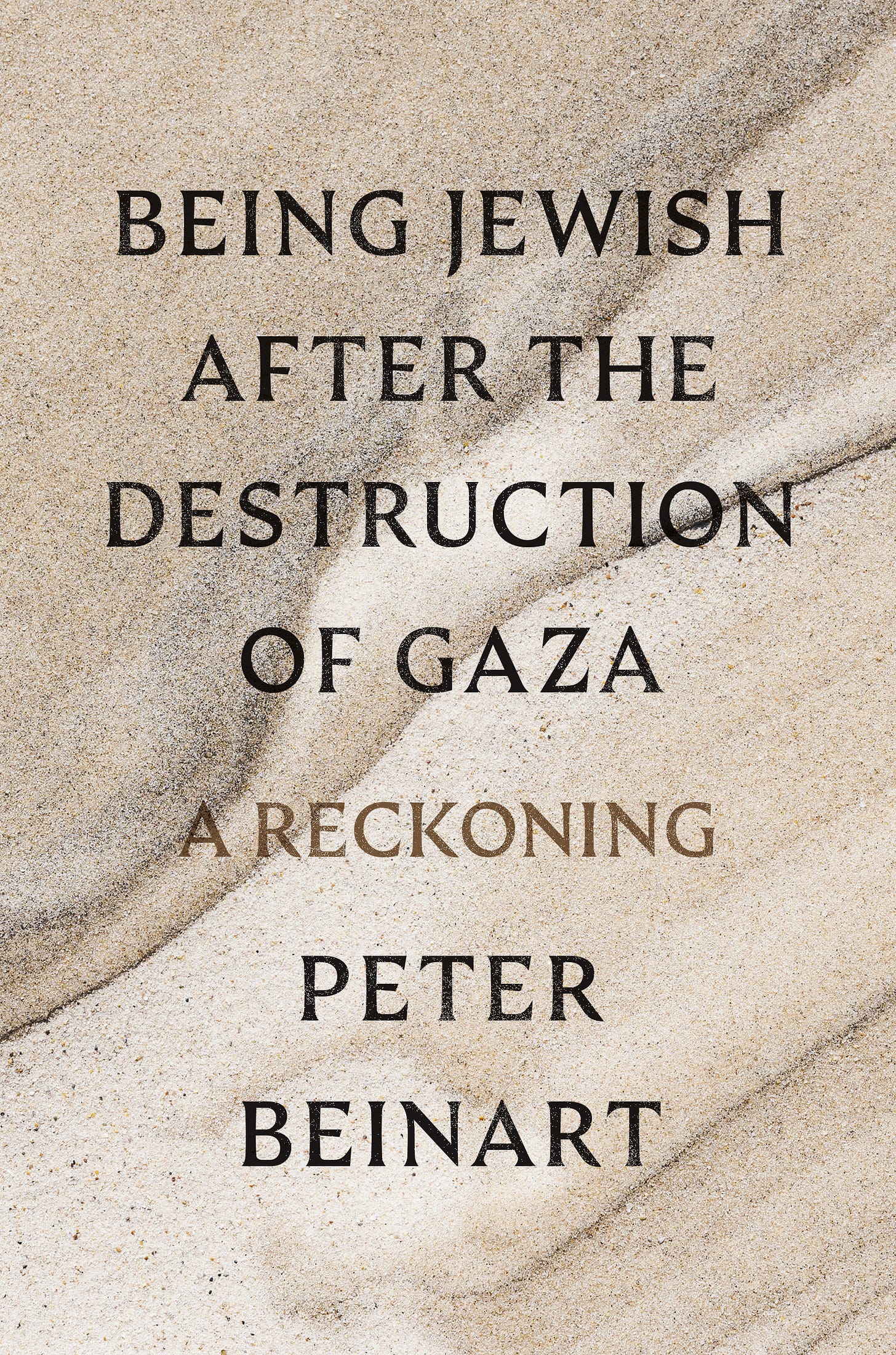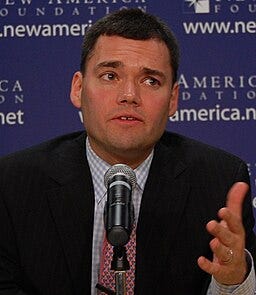When Israel becomes a lost cause
Wherever he is on the Jewish state, Peter Beinart has always arrived there before the rest of the Jewish community. Now, in his shock over Israel's fierce war in Gaza, he may find himself alone
It’s hard to know what Peter Beinart was hoping to accomplish with his new book. Its title – “Being Jewish after the Destruction of Gaza” – is vague, not what one would call catchy. Nor is it obvious how wide a range of Jewish audiences will be open to reading it. While the author’s website has details about a number of public appearances in coming months, the last time I checked, none of them was scheduled to take place at a synagogue or a JCC. My guess is that with this book, Beinart has finally placed himself beyond the pale among the majority of the community he wants to reach. If that wasn’t already the case.
None of that is intended as a dismissal of “Being Jewish after the Destruction of Gaza” or its author, who more than a decade ago took on the thankless role of a veritable internal auditor on the subject of Israel for American Jewry. If you have followed him, whether in Haaretz, the Forward, The New York Times, Jewish Currents, or any of the other written or electronic media where he has alighted over this period, you already know that Beinart is at the far-left politically in his critique of Israel. Wherever that puts him an a given day, he always seems to have arrived there before the rest of us. I, for one, have always appreciated that.

After several readings of this short book (125 pages, plus notes), though, I remain uncertain as to just where Beinart wants to take his readers. Despite its title, “Being Jewish…” is not a guide for Jewish practice in a post-Zionist Diaspora. It’s more of a brief for excising the State of Israel from your spiritual life, after which you’re free to choose your direction, although those who want to know the choices that are available, in America at least, would do better looking in Joshua Leifer’s recent “Tablets Shattered: The End of an American Jewish Century and the Future of Jewish Life.” Leifer attempts there to understand how U.S. Jewry has reorganized itself over the past half-century, even as he himself has decided to live his life in Israel.
As for Peter Beinart, after years of attempting to recruit his fellow Diaspora Jews to join the fight for a more moral and just Israel – one that ends the occupation and consents to Palestinian sovereignty on part of the Land, equalizes the status of Arab citizens within Israel, and commits itself to being a genuine democracy -- Beinart seems to have concluded that it’s a lost cause.
In fact, “Being Jewish after the Destruction of Gaza” makes the case, on multiple levels, that the State of Israel is no longer worthy of Jews’ support, and not only because, as Beinart believes, it is guilty of genocide in Gaza.
If the argument between left-wing Zionists and anti-Zionists has for decades been over “1967 borders” versus “1948 borders” – that is, those who believed that Israel could redeem itself if only it would withdraw from the territories it conquered in the Six-Day War, as opposed to those who contended that a Jewish nation-state was unacceptable within any borders – Beinart has now come down on the side of the latter. So while he no longer sees a possibility of Israel voluntarily ending the occupation, he also no longer views such a move as sufficient by itself.
Part of what makes reading Beinart worthwhile, if challenging – some would say, infuriating -- is that he still considers himself very much a part of the Jewish people. In this book, in fact, he argues that it is his understanding of Jewish teachings that have led him to his harsh judgment of Israel. (More on that below.)

We can’t say he didn’t warn us. Beinart, 53, spent the years 1996-2003 as editor in chief of The New Republic, when it was still owned by Martin Peretz and refrained from criticizing Israel. By 2012, when he published “The Crisis of Zionism,” Beinart was trying to reconcile the “tension between Israel’s responsibility to the Jewish community and its responsibility to all its people, Jewish and non-Jewish alike,” while warning that if it failed “in that struggle, it will either cease being a Jewish state or cease being a democratic one.”
“Being Jewish” covers a lot of the same territory as “The Crisis of Zionism,” but goes further in its conclusions, mainly, I suspect, because the author is still in shock over the Gaza War.
Beinart harks back to 1947, for example, to argue that the Palestinian leadership had every reason to reject the United Nations 1947 plan for partitioning the Land of Israel, which if implemented would have meant that nearly half of the population of the state designated for the Jews would have been Palestinian, with 80 percent of its arable land owned by them. For the Jewish state to be viable, it would have had to expel most of its Arab and expropriate their land. Which of course is what happened in the war that ensued.
At the same time, Beinart debunks the standard Zionist claim that the reason 750,000 Palestinians became refugees in 1948-49 was, as Benjamin Netanyahu wrote in his 1993 book “A Place Among the Nations,” that they were being instructed to do so by the Arab governments, which “exhort[ed] them to leave in order to clear the way for the invading armies,” even as the “Jews pleaded with their Palestinian Arab neighbors to stay.” In truth, says Beinart, by May 14, 1948, “when Israel declared independence and the Arab governments declared war,” the Jews had already driven as many as half of the Palestinians from their homes. By that date, for example, “Zionist forces had already largely depopulated Jaffa and Haifa, Palestine’s two largest cities.”
But didn’t Israel offer citizenship to the approximately 150,000 Palestinian Arabs who remained in the country after the war, and haven’t they thrived in the intervening decades? Maybe, writes Beinart, but the citizenship of Israel’s Arabs is “of a profoundly second-class kind. They can vote and serve in parliament but attend segregated schools and cannot marry Jews inside Israel since Israel has no civil marriage.” (That last point is a bit tendentious, since any couple that has married legally outside Israel will have their union recognized when they return home. What’s indefensible is the “temporary” measure that has been renewed annually for more than two decades that prevents Palestinians who marry Israeli citizens from becoming citizens themselves or even residing with their spouses in Israel.) It’s also undeniable that allocation of government budgets and, especially, of land, have always, as a matter of principle, favored Jewish communities over Arab ones.
A few pages later, after Beinart has delineated the cruelties and injustices of the occupation, he tells us how, “under international law, there is a word for legal dominance based on ethnicity, religion, or race … It is not ‘self-determination.’ It is ‘apartheid.’”
Beinart is a little vague on this point, but if I read him correctly, he is saying that the term “apartheid” applies in both the occupied territories and in sovereign Israel.
It’s not correct, and it isn’t useful, to describe the legal regime defining relations between Jews and Arabs within sovereign Israel as apartheid, a concept that remains anathema to most Israelis. That being said, since at least the passage of the Nation-State Law, in 2018, Jewish nationalism in Israel has become increasingly chauvinistic, even exclusivist, and we are not even agreed as a society on the need to educate our children in the values of equality, democracy or the rule of law. Especially frightening is the understanding that the growing chauvinism draws on a dangerous, messianic form of Jewish fundamentalism that rejects Enlightenment values. This was a trend that always existed in Israeli society, but in recent years it has emerged from the shadows, having been encouraged and cultivated by a prime minister who seems willing to agree to anything to keep his governing coalition together.
For these and other, well-known reasons, not only Peter Beinart has concluded that two states are no longer a practical option, and he sees no alternative to reconstituting Israel and the Palestinian territories as a single, democratic state, all of whose citizens have equal rights, and equal access to all public resources.
Aware that most Israeli Jews are convinced that “a state of all its citizens” is a euphemism for the mass murder, or at best mass exile, of Israel’s Jews, Beinart tries to make the case that Palestinians don’t want to destroy Israel, and that it’s the Jews who are holding up any reconciliation by their uncompromising refusal to share the land. That is, if in 1973, Abba Eban could wryly observe that “the Arabs never miss an opportunity to miss an opportunity,” for at least two decades that line has applied no less to the Jews.
Beinart reminds us how, over the past decade and a half, Netanyahu, instead of cultivating a Palestinian leadership with which it might be possible to do business, has instead done all it could to weaken and delegitimize the Palestinian Authority, even though that body long ago declared its readiness to recognize Israel, and to this day continues to police the West Bank for our benefit. At the same time, until October 2023, it provided Hamas with the oxygen that allowed it to remain in charge in Gaza, keeping alive an enemy that all agreed could never be a partner to peace.
There is enough fault to share among both Palestinians and Israelis for our having come to the desperate pass where we now are, but Beinart seems locked into a largely binary approach here, placing most of the fault on Israel’s shoulders. Not that he remotely excuses Hamas’s attack on the western Negev – how could he? -- but he is at pains to defend the perpetrators from the charge of being latter-day Nazis. There are, he writes, “better analogies. October 7 has more in common with the murder, torture, and rape of thousands of Europeans in newly independent Haiti in 1804, or the Fort Mims massacre of white settlers by Creek Indians in what is now Alabama in 1813, or the Lari massacre by Mau Mau rebels seeking to overthrow British colonialism in Kenya in 1953 -- gruesome, pitiless attacks by oppressed peoples resisting dispossession.”
If Jews reject those analogies, Beinart goes on, it’s not simply because, like me, they aren’t familiar with them, but rather because the cases are “alien and uncomfortable -- the equivalent of imagining Hagar murdering Abraham and Sarah or the seven nations of Canaan massacring the forces of Joshua Ben Nun. They alter the script that explains who we are.”
If we can make our way out of the confusing thicket of analogies upon analogies that comprise those passages, we will understand that Beinart has adopted the approach that sees Israel as a colonial enterprise. That makes the residents of the border towns and kibbutzim of the Western Negev alien settlers who, even if they were innocent on the individual level, got what was coming to them as a group on October 7.
As for the campus demonstrators in the U.S. who came out to express support for Hamas in the weeks and months following the massacres, Beinart isn’t outraged by them; rather, he says he’s just sorry that there weren’t “more pro-Palestinian activists [who] had clearly committed themselves to the rules of war,” a very indirect way of saying it would have been nice if they had been able to condemn the murder, rape, torture and kidnapping that took place on October 7 and after. To that he adds the tepid criticism that this was “an extremely inopportune time for slogans that blur the line between different forms of resistance.” He’s referring here to “ambiguous” phrases like, “From the river to the sea.” Israelis reasonably understand that line as genocidal in intent, although Beinart notes that it’s also the doctrine of Israel’s ruling party, reminding us that “the founding charter of Netanyahu’s Likud Party [from 1977] declares, ‘Between the Sea and the Jordan there will be only Israeli sovereignty.’”
Nice point. But if Beinart wants to prove the benign intentions of Hamas and its so-called progressive supporters, quoting the party that gave a big, early push to the monster that is the settlement movement is not the best way to do it. That also goes for U.S. Rep. Rashida Tlaib, whom he approvingly quotes for having described the “river to the sea” phrase as “an aspirational call for freedom, human rights and peaceful coexistence.” That’s about as convincing as Benjamin Netanyahu’s claim in mid-February that the Trump plan for making Gaza Palestinian-rein is “not ethnic cleansing, it’s about giving people agency over their own lives.”
Beinart’s righteous outrage toward Israel over the destruction of Gaza makes him surprisingly insensitive to Israelis’ genuine pain, and oblivious to the ongoing failure of Palestinians to convince the world that they are united in their readiness to use peaceful methods to work out a mutually beneficial compromise with Israel.
Beinart cites surveys suggesting that Palestinians’ willingness to turn to violence ebbs and flows in correlation with, in the words of pollster Khalil Shikaki, “the level of pain and suffering imposed by the policies and actions of Israel.” Does that mean that there isn’t a significant portion of the Palestinian people, among others, who remain dedicated to destroying Israel?
This might not be the best time to try and persuade Israeli Jews that they needn’t fear the idea of living in a state “of all its citizens.” Berating them for their inability to see that the Palestinians are no less victims than they are isn’t the way to win over Israelis’ hearts and minds.
As I suggested above, I suspect that Beinart’s lack of empathy derives from the horror he feels in the face of “the destruction of Gaza.” Early on, he declares that “this book is about the story that Jews tell themselves to block out the screams” coming from the Strip. And in an interview with the Guardian accompanying the book’s publication in January, he described Israel’s recent actions there as “the most profound desecration of the central idea of the absolute and infinite worth of every human being.”

But for Israelis, the trauma of October 7 remains as fresh as it was 15 months ago. They are not interested in knowing what Israel has wrought in Gaza, and they are unable to imagine their people and the Palestinians ever living in peace, certainly not in a single, democratic state. They are even unwilling to understand that Palestinian citizens of Israel can be mourning the huge number of deaths in Gaza without that making them Hamas supporters or a security threat to Israel. Peter Beinart will not assist their understanding in any of those areas.
Ultimately, Beinart marshals a religious argument against Israel, citing the humanist Rabbi Abraham Joshua Heschel and Yeshayahu Leibowitz. The former said: “To act in the spirit of religion is... to remember that humanity as a whole is God’s beloved child. To act in the spirit of race is to sunder, to slash, to dismember the flesh of living humanity.” Leibowitz, says Beinart, thought that many Jews misunderstood the meaning of being a “chosen people.” “For Leibowitz, it was essential that being chosen by God did not make Jews better than anyone else. It meant they had a special set of obligations -- to follow the Torah’s commandments -- not a special set of virtues.”
This is how Beinart arrived at the main talking point of his book, and the subject of a January oped in The New York Times: that Jews today have turned their support of Israel into a form of idolatry. “When America’s most influential Jewish groups, like American leaders, insist again and again that Israel has a right to exist, they are effectively saying there is nothing Israel can do — no amount of harm it can inflict upon the people within its domain — that would require rethinking the character of the state.”
For anyone living in Israel during the current war, it should be obvious that more than in previous campaigns, a large proportion of the population views the fight in religious terms. That is because the attack of October 7 had an almost-apocalyptic quality to it, because this particular enemy frames its war against Israel as a religious jihad, and because large numbers of our own combat soldiers are encouraged by their rabbis [DG9] and commuinities to see their mission as holy and redemptive. (A year ago, lawyer and social activist Ariel Schwartz wrote a chilling essay describing this growing tendency, which sees “divine revelation specifically in times of war and view those moments as the zeniths of Jewish and human history.”)
Peter Beinart obviously understands that Israel is in the midst of an internal conflict that is no less of a threat to its existence than the unending war with the Palestinians. On one side of the conflict are those Jews who believe in the equality of all humans, in the rule of law and the belief that the law must apply to all equally, and who recognize that they are not the only people who have a claim to this land. On the other side is a perfidious alliance of Jews who see our people as inherently superior, and who are convinced they are in possession of a divine truth that turns their fellow Jews who don’t share their faith into the enemy. They have no interest in sharing the Land of Israel with its Palestinian inhabitants, certainly not on an equal footing.
We saw evidence, however, that a substantial portion of Israeli Jews, if not a majority, still believes in equality and democracy during a year’s worth of resistance to the Netanyahu government’s attempt to destroy the legal and judicial system, in 2023. It is true that the protest movement went to lengths to leave the occupation out of the conversation, a tactical decision I can understand but don't defend. But this is not the time for people who care about Israel and its people – and I believe that Peter Beinart is among them – to give up on the state. The battle for the future of Israel is far from decided, and Jews who have concluded that the state has relinquished its right to exist and that it must be replaced with a single entity that does not recognize and respect the national characters of its two peoples, are removing themselves from the conversation and the struggle.






I’m sorry, Beinart isn’t “ahead of the Jewish community” on anything. He’s a token Jew at the head of anti-Israel and antisemitic propaganda by the Free Palestine cult and Islamist terrorists. The only people in the Jewish community who listen to his Hamas supporting bullshit are spineless progressives and who are watching their pathetic Free Palestine cult member children wrap themselves in keffiyehs and advocate for the genocide and ethnic cleansing of 7.7 million Israeli Jews, the largest Jewish community in the world. There is zero difference between Nazi sympathizers and the Free Palestine cult. They want the same exact outcome, and are just as violent toward the diaspora Jewish community.
We have already had far-left token Jews during the Soviet era. Like the Free Palestine cult’s Beinart, the Yevsektsitya advocated for the destruction of Zionism, and persecuted Jews on behalf of their antisemitic masters. The ended up in Gulags and shot in the head in purges, and we have seen how far-leftists turn on their token Jew apologists. We have also had far-left cults before, like Jim Jones’ People’s Temple. I can only hope that token Jews like Beinart end up exactly like Jonestown.
Fluck Beinart. He completely misses that the Palestinians want to destroy Israel. So 2 states will not work in this generation.